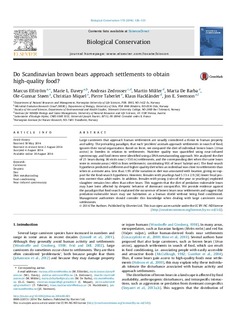Do Scandinavian brown bears approach settlements to obtain high-quality food?
Elfström, Marcus; Davey, Marie Louise; Zedrosser, Andreas; Müller, Martin; De Barba, Marta; Støen, Ole-Gunnar; Miquel, Christian; Taberlet, Pierre; Hackländer, Klaus; Swenson, Jon
Journal article, Peer reviewed
Permanent lenke
http://hdl.handle.net/11250/2437943Utgivelsesdato
2014Metadata
Vis full innførselSamlinger
Sammendrag
Large carnivores that approach human settlements are usually considered a threat to human property and safety. The prevailing paradigm, that such ‘problem’ animals approach settlements in search of food, ignores their social organization. Based on feces, we compared the diet of individual brown bears (Ursus arctos) in Sweden in relation to settlements. Nutritive quality was quantified using near-infrared spectroscopy, and food items were identified using a DNA metabarcoding approach. We analyzed the diet of 21 bears during 36 visits near (<150 m) settlements, and the corresponding diet when the same bears were in remote areas (>600 m from settlements; constituting 95% of bears’ habitat use). The food-search hypothesis predicted a different and higher-quality diet when an individual was close to settlements than when in a remote area. Less than 1.9% of the variation in diet was associated with location, giving no support for the food-search hypothesis. However, females with yearlings had 5.1% ± 2.9 (SE) lower fecal protein content than adult males. In addition, females with young (cubs-of-the-year or yearlings) exploited slaughter remains less often than other bears. This suggests that the diet of predation-vulnerable bears may have been affected by despotic behavior of dominant conspecifics. We provide evidence against the paradigm that food search explained the occurrence of brown bears near settlements and suggest that predation-vulnerable bears may use habitation as a human shield without being food conditioned. Management authorities should consider this knowledge when dealing with large carnivores near settlements.

